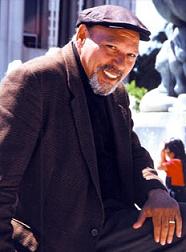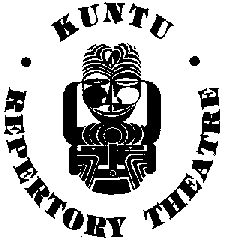Related Research Articles

August Wilson was an American playwright. He has been referred to as the "theater's poet of Black America". He is best known for a series of ten plays, collectively called The Pittsburgh Cycle, which chronicle the experiences and heritage of the African-American community in the 20th century. Plays in the series include Fences (1987) and The Piano Lesson (1990), both of which won the Pulitzer Prize for Drama, as well as Ma Rainey's Black Bottom (1984) and Joe Turner's Come and Gone (1988). In 2006, Wilson was inducted into the American Theater Hall of Fame.

The Black Arts Movement (BAM) was an African American-led art movement that was active during the 1960s and 1970s. Through activism and art, BAM created new cultural institutions and conveyed a message of black pride.
Robert Lee "Rob" Penny was an American playwright, poet, social activist, and professor. Penny wrote more than 30 plays and 300 poems.

Edward Artie Bullins, sometimes publishing as Kingsley B. Bass Jr, was an American playwright. He won awards including the New York Drama Critics' Circle Award and several Obie Awards. Bullins was associated with the Black Arts Movement and the Black Panther Party, for which he was the minister of culture in the 1960s.
Paul Carter Harrison was an American playwright and professor. Harrison was known for works such as his Obie Award winning play The Great MacDaddy and scholarly writings on theater and performance. Between 1962 and 1982, he produced or directed numerous American and Dutch plays and screenplays.

Pittsburgh Creative and Performing Arts 6–12 (CAPA) is a magnet school located in the Cultural District of Downtown Pittsburgh, Pennsylvania. CAPA is one of four 6th to 12th grade schools in the Pittsburgh Public Schools. It was formed from a merger between CAPA High School and Rogers CAPA Middle School.

Larry Neal or Lawrence Neal was a scholar of African-American theatre. He is well known for his contributions to the Black Arts Movement of the 1960s and 1970s. He was a major influence in pushing for black culture to focus less on integration with White culture, to that of celebrating their differences within an equally important and meaningful artistic and political field, thus celebrating Black Heritage.

Amiri Baraka, previously known as LeRoi Jones and Imamu Amear Baraka, was an American writer of poetry, drama, fiction, essays and music criticism. He was the author of numerous books of poetry and taught at several universities, including the University at Buffalo and Stony Brook University. He received the PEN/Beyond Margins Award in 2008 for Tales of the Out and the Gone. Baraka's plays, poetry, and essays have been described by scholars as constituting defining texts for African-American culture.

The Nuyorican Poets Cafe is a nonprofit organization in Alphabet City, on the Lower East Side of Manhattan. It is a bastion of the Nuyorican art movement in New York City, and has become a forum for poetry, music, hip hop, video, visual arts, comedy, and theater. Several events during the PEN World Voices festival are hosted at the cafe.
Dutchman is a play written by African-American playwright Amiri Baraka, then known as LeRoi Jones. Dutchman was first presented at the Cherry Lane Theatre in Greenwich Village, New York City, in March 1964. The play won an Obie Award; it shared this distinction with Adrienne Kennedy's Funnyhouse-of-a-Negro. Baraka's stage play was made into a film in 1967, starring Shirley Knight and Al Freeman Jr. Dutchman was the last play produced by Baraka under his birth name, LeRoi Jones. At the time, he was in the process of divorcing his Jewish wife, Hettie Jones, and embracing Black Nationalism. Dutchman may be described as a political allegory depicting black and white relations during the time Baraka wrote it.

Kuntu Repertory Theatre was a primarily student-based, African-American repertory theatre in Pittsburgh, Pennsylvania, United States.
The National Black Writers Conference is presented by the Center for Black Literature (CBL) at Medgar Evers College of The City University of New York. Founded by Dr. Brenda M. Greene, the Center for Black Literature was officially approved by the College Council of Medgar Evers College and by the Board of Trustees in October 2002. Its mission is to expand, broaden, and enrich the public's knowledge and aesthetic appreciation of literature produced by people of the African Diaspora. It accomplishes its mission through a variety of programs and partnerships and by serving as a forum for the discussion, reading, research, study, and critical analysis of Black literature. It is the only center devoted to this mission in the country.
The Poet Laureate of New Jersey was an honor presented biennially by the Governor of New Jersey to a distinguished New Jersey poet. Created in 1999, this position existed for less than four years and was abolished by the legislature effective July 2, 2003. When the New Jersey State Legislature created the laureate position, the bill provided specifically for the creation of an award named in honor of twentieth-century poet and physician William Carlos Williams (1883–1963) who resided in Rutherford, New Jersey. However, the legislature recognized that the award's recipient would "be considered the poet laureate of the State of New Jersey for a period of two years." Before the position was abolished, only two poets, Gerald Stern and Amiri Baraka, had been appointed as the state's poet laureate.
The Penumbra Theatre Company, an African-American theatre company in Saint Paul, Minnesota, was founded by Lou Bellamy in 1976. The theater has been recognized for its artistic quality and its role in launching the careers of playwrights including two-time Pulitzer Prize-winner August Wilson.
Joshua Elijah Reese is an American actor.
Pittsburgh Playwrights Theatre Company is a professional theatre company located in Pittsburgh, Pennsylvania, United States. Founded in 2003 by artistic director Mark Clayton Southers, the company originally held productions at the Penn Theater in Garfield and moved to a new space on Penn Avenue in Pittsburgh's Cultural District. It now holds productions in a space on Liberty Avenue in the same building used by Bricolage Production Company, as well as the August Wilson Center for African American Culture, where Southers is artistic director of theatre initiatives.

Theater in Pittsburgh has existed professionally since the early 1800s and has continued to expand, having emerged as an important cultural force in the city over the past several decades.
Arena Players Incorporated is the oldest continually performing and historically African-American community theatre in the United States located in Baltimore, Maryland.
Ernest McCarty Jr. is an upright bass player, musical composer, and playwright. He is known for playing with Erroll Garner from 1970 until Garner's death in 1977, as well as for plays he has written, scored and directed.
References
- Conner, Lynne (2007). Pittsburgh in Stages: Two Hundred Years of Theater. Pittsburgh: University of Pittsburgh Press. ISBN 0-8229-4330-1.
Black Horizons Theater (BHT) (note the "s" in the name, which is the authentic title of the theater group, with all of its plural and future-oriented intention) was created after a meeting of Black Action Society (BAS) of the University of Pittsburgh representative's Curtiss E. Porter (now Ph.D. and Chancellor of Penn State Greater Allegheny Campus in White Oak/ McKeesport, Pa.), Jake Milliones, Ph.D. (deceased, former City Council President of the City of Pittsburgh) and E. Philip McKain (currently Executive Director of CTE , the Community Action Program of Stamford, Ct.) with members of the "Centre Ave. Poets", Rob Penny and August Wilson.
This meeting culminated with an agreement to provide funding through the Program Committee of the BAS, which Porter headed as Director, while Mr. McKain was Co-Director, and Mr. Milliones, an influential graduate student member. The funding connection was established. BAS provided honoraria to Penny and Wilson and funds for rent and publicity. The plays went into production at the A. Leo Weil Elementary School.
The connection of the BAS was incipient to the early development of the BHT. BAS provided the theater with leadership, funding, and major portions of the early audiences. Students from the University of Pittsburgh attended under the auspices of their Black Studies classes. One such student would have been best-selling author, Elizabeth "Bebe" Moore-Campbell. Through the attendance of students of the BAS-sponsored Department of Black Community Education Research and Development (DBCERD - Black Studies), and, from the expanding community audiences made available through publicity of the plays, the BHT flourished. Indeed, BHT became a repertoire theater which performed in numerous locations, including Oberlin College in Ohio and at Barbara Ann Teer's National Black Theatre (NBT) in Harlem, New York, New York.
Curtiss Porter, who is often underwritten or completely left out of the history of these circumstances, was a writer and Director of some of BHT's earliest productions: Evolution to Revolution by Porter and Amiri Baraka's Slave Ship.